THE MUTUAL CULTIVATION OF SELF AND THINGS
WORLD PHILOSOPHIES
Bret W. Davis, D. A. Masolo, and Alejandro Vallega, editors
THE MUTUAL CULTIVATION OF SELF AND THINGS
A Contemporary Chinese Philosophy of the Meaning of Being
Yang Guorong
Foreword by Hans-Georg Moeller
Translated by Chad Austin Meyers

This book is a publication of
Indiana University Press
Office of Scholarly Publishing
Herman B Wells Library 350
1320 East 10th Street
Bloomington, Indiana 47405 USA
iupress.indiana.edu
Peking University Press 2011
The Chinese edition is originally published by Peking University Press. This translation is published by arrangement with Peking University Press, Beijing, China. All rights reserved. No reproduction and distribution without permission.

2016 by Indiana University Press
All rights reserved
No part of this book may be reproduced or utilized in any form or by any means, electronic or mechanical, including photocopying and recording, or by any information storage and retrieval system, without permission in writing from the publisher. The Association of American University Presses Resolution on Permissions constitutes the only exception to this prohibition.
 The paper used in this publication meets the minimum requirements of the American National Standard for Information SciencesPermanence of Paper for Printed Library Materials, ANSI Z39.48-1992.
The paper used in this publication meets the minimum requirements of the American National Standard for Information SciencesPermanence of Paper for Printed Library Materials, ANSI Z39.48-1992.
Manufactured in the United States of America
Cataloging information is available from the Library of Congress.
ISBN 978-0-253-02107-6 (cloth)
ISBN 978-0-253-02111-3 (paperback)
ISBN 978-0-253-02119-9 (ebook)
1 2 3 4 5 21 20 19 18 17 16
Contents
/ Hans-Georg Moeller
Foreword
Contexts and Concepts: Yang Guorongs Concrete Metaphysics
HANS-GEORG MOELLER
YANG GUORONG IS one of the most creative and prominent Chinese philosophers of our time. He is a truly Chinese philosopher not because of his citizenship, ethnicity, or workplace, but because of the nature of his work. Yang makes ample use of the complete range of sources provided by the Chinese philosophical tradition, including all its periods and all its schools (in addition to his reliance on the Western philosophical canon). Thus to call him, for example, a Confucian would not do justice to the breadth of his approach. More important, however, Yang is also truly a philosopher, because he does not only study the history of philosophy or engage in specialized debates within the academic discipline of philosophy but has developed his own comprehensive philosophical system.
The core of his philosophical work is an outline of his Concrete Metaphysics (juti de xingshangxue ) published in three volumes in 2011: A Treatise on Dao (Dao lun
) published in three volumes in 2011: A Treatise on Dao (Dao lun ), Ethics and Being: Treatise on Moral Philosophy (Lunli yu cunzai: daode zhexue yanjiu
), Ethics and Being: Treatise on Moral Philosophy (Lunli yu cunzai: daode zhexue yanjiu ), and the present The Mutual Cultivation of Self and Things (Chengji yu chengwu: yiyi shijie de shengcheng
), and the present The Mutual Cultivation of Self and Things (Chengji yu chengwu: yiyi shijie de shengcheng ). Taken together, these books present an elaborated and encompassing philosophy, addressing perennial ontological, epistemological, and ethical questions. Yang thereby follows the trend of major twentieth-century Chinese thinkers who tried to renew the Chinese philosophical tradition of Neo-Confucianism and its efforts to merge Confucianism, Buddhism, and Taoism into an overarching whole while at the same time incorporating the metaphysical, historical, and existential approaches of modern Western systemic philosophy as represented by authors like Kant, Hegel, and Heidegger. In short, Yangs project establishes a unifying grand philosophy by combining traditional Chinese and Western conceptualizations into a systematic synthesis expressed in contemporary language.
). Taken together, these books present an elaborated and encompassing philosophy, addressing perennial ontological, epistemological, and ethical questions. Yang thereby follows the trend of major twentieth-century Chinese thinkers who tried to renew the Chinese philosophical tradition of Neo-Confucianism and its efforts to merge Confucianism, Buddhism, and Taoism into an overarching whole while at the same time incorporating the metaphysical, historical, and existential approaches of modern Western systemic philosophy as represented by authors like Kant, Hegel, and Heidegger. In short, Yangs project establishes a unifying grand philosophy by combining traditional Chinese and Western conceptualizations into a systematic synthesis expressed in contemporary language.
Yangs philosophy is called a metaphysics for two major reasons. First, he thereby connects with the systematic methodology of Western philosophy beginning (arguably) with Plato and Aristotle. A systematic philosophy integrates all traditional fields of enquiry, that is, ontology, ethics, and epistemology. Thereby, it naturally cannot be confined to one of the contemporary professional areas of specialization such as philosophy of science, political philosophy, or philosophy of mind, and much less be concerned with debating (or solving) specifically isolated or constructed questions as sometimes attempted in contemporary analytic philosophy. A systematic philosophy will, of course, also deal with specific questions, and it will address ontological, ethical, and epistemological issues, but it always does so with an overarching coherence in mind. The truth that emerges within or from a philosophical system cannot be grasped by summing up the truth values of its propositions, but by developing the capacity to see the connections that bind the various parts of the work together. The readers task is not to measure up the qualities of each individual component on its own, but rather to appreciate the intricate architecture of the systematic edifice.
A true metaphysics does not abstractin the sense of de-contextualizeits objects, but, to the contrary, always looks at them in conjunction with, to speak with Kant, the conditions of their possibility. Any object of cognition, for instance, is to a certain extent constituted by the cognitive subject for which it is an object. In this sense, metaphysics is, methodologically speaking, the art of contextualizing knowledge by not only trying to know something as something, but by also reflecting on the constitutive conditions that make something appear as that which it is. Or, to put it quite simply in Hegels famous words: Das Wahre ist das Ganze (the truth is the whole.)
Second, as to its contents, metaphysics, in the sense of the term in the European tradition that Yang relates to, is concerned with reality, or, again, in more succinct Hegelian language, with Wirklichkeit. The German word wirken shares the same etymological root with the English word work. Thus, a true metaphysics is not merely concerned with how the world is, but more precisely with how it works. The contents of a metaphysical investigation are thus not just things, but, in the terminology of Yang Guorong and the Chinese tradition he connects with, affairs (shi ). Reality is not an assemblage of facts that philosophy can establish or find out there; rather, it is a work in progress, a living body of relations, effects, powers, conflicts, combinations, and so on, within which philosophy itself partakes or works. Thus, metaphysics does not primarily focus on the simple and narrow meaning of whatever it deals with, but on the world of meaning (
). Reality is not an assemblage of facts that philosophy can establish or find out there; rather, it is a work in progress, a living body of relations, effects, powers, conflicts, combinations, and so on, within which philosophy itself partakes or works. Thus, metaphysics does not primarily focus on the simple and narrow meaning of whatever it deals with, but on the world of meaning (
Next page



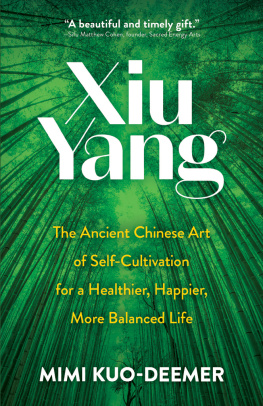
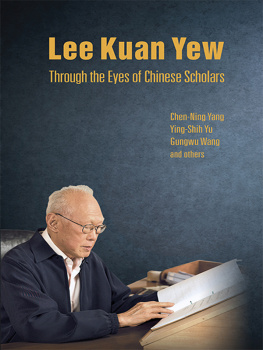


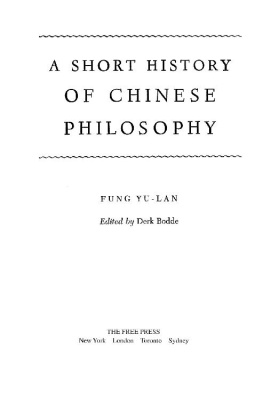
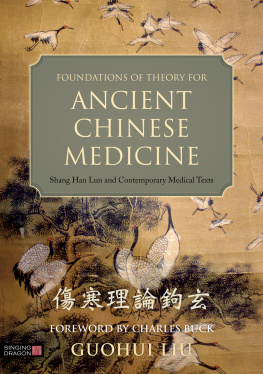
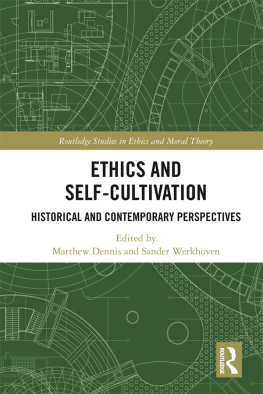
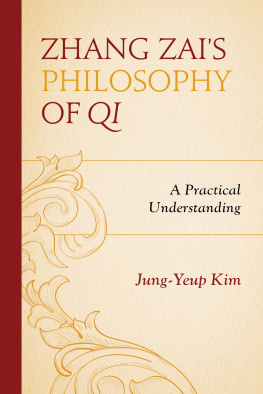
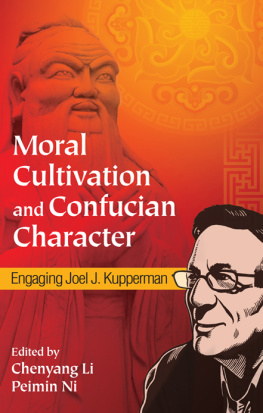


 The paper used in this publication meets the minimum requirements of the American National Standard for Information SciencesPermanence of Paper for Printed Library Materials, ANSI Z39.48-1992.
The paper used in this publication meets the minimum requirements of the American National Standard for Information SciencesPermanence of Paper for Printed Library Materials, ANSI Z39.48-1992. ) published in three volumes in 2011: A Treatise on Dao (Dao lun
) published in three volumes in 2011: A Treatise on Dao (Dao lun ), Ethics and Being: Treatise on Moral Philosophy (Lunli yu cunzai: daode zhexue yanjiu
), Ethics and Being: Treatise on Moral Philosophy (Lunli yu cunzai: daode zhexue yanjiu ), and the present The Mutual Cultivation of Self and Things (Chengji yu chengwu: yiyi shijie de shengcheng
), and the present The Mutual Cultivation of Self and Things (Chengji yu chengwu: yiyi shijie de shengcheng ). Taken together, these books present an elaborated and encompassing philosophy, addressing perennial ontological, epistemological, and ethical questions. Yang thereby follows the trend of major twentieth-century Chinese thinkers who tried to renew the Chinese philosophical tradition of Neo-Confucianism and its efforts to merge Confucianism, Buddhism, and Taoism into an overarching whole while at the same time incorporating the metaphysical, historical, and existential approaches of modern Western systemic philosophy as represented by authors like Kant, Hegel, and Heidegger. In short, Yangs project establishes a unifying grand philosophy by combining traditional Chinese and Western conceptualizations into a systematic synthesis expressed in contemporary language.
). Taken together, these books present an elaborated and encompassing philosophy, addressing perennial ontological, epistemological, and ethical questions. Yang thereby follows the trend of major twentieth-century Chinese thinkers who tried to renew the Chinese philosophical tradition of Neo-Confucianism and its efforts to merge Confucianism, Buddhism, and Taoism into an overarching whole while at the same time incorporating the metaphysical, historical, and existential approaches of modern Western systemic philosophy as represented by authors like Kant, Hegel, and Heidegger. In short, Yangs project establishes a unifying grand philosophy by combining traditional Chinese and Western conceptualizations into a systematic synthesis expressed in contemporary language. ). Reality is not an assemblage of facts that philosophy can establish or find out there; rather, it is a work in progress, a living body of relations, effects, powers, conflicts, combinations, and so on, within which philosophy itself partakes or works. Thus, metaphysics does not primarily focus on the simple and narrow meaning of whatever it deals with, but on the world of meaning (
). Reality is not an assemblage of facts that philosophy can establish or find out there; rather, it is a work in progress, a living body of relations, effects, powers, conflicts, combinations, and so on, within which philosophy itself partakes or works. Thus, metaphysics does not primarily focus on the simple and narrow meaning of whatever it deals with, but on the world of meaning (